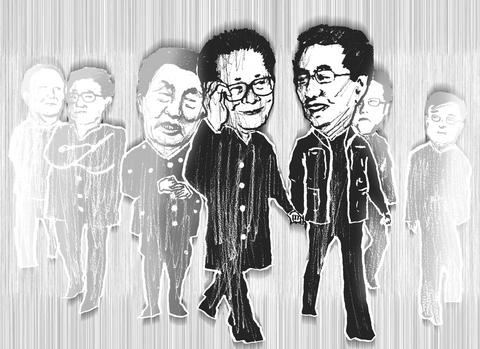What political reforms will Hu Jintao (
Hu Jintao's career does not inspire optimism. A 1998 Xinhua report quoted him as saying that "A good leader should carry forward democracy." But Hu's idea of democracy doesn't appear to contain ideas about the direct election of top leaders or of guaranteed individual freedoms.
According to Wu Jiaxiang (

ILLUSTRATION: MOUNTAIN PEOPLE
Hu wants nothing to do with increasing political participation or outside checks on communist party power. In various speeches, he warned against fiddling with the party's Leninist foundation. He advocates greater internal party democracy but rejects system-wide democracy. His top three aides in the Central Committee -- Ling Jihua (
Hu's behavior confirms his conservatism. Hu sanctioned a military crackdown in Tibet in March 1989, reversing a liberalizing policy introduced by former party General Secretary Hu Yaobang (
The issue of meaningful reform is almost certain to surface early on Hu's watch. Forces are building inside the party, as evidenced by a stream of surveys, journal articles, and academic debates, that may lead to a split on the issue of reform in Hu's first term. Such a split happened in the 1986-89 period, contributing to party's initially confused reactions to the Tiananmen protests. Failure to move on the issue in his first five years may cause Hu to be supplanted, informally if not formally, by others willing to embrace change.
So, how will Hu respond? Will he, like Gorbachev, see the writing on the wall and lead the charge? Or will he be pushed aside by others willing to modernize China's political system more aggressively?
Hu's key rivals are Li Ruihuan (
Both Li and Zeng urge cadres to learn from America's democratic system. Zeng even maintains secretive but close ties to overseas pro-democracy groups and, some analysts believe, would reverse the official verdict on the 1989 Tiananmen protests and lift the ban on opposition parties and a free press if the opportunity were to arise.
So the key question for political reform concerns which man gains the upper hand. Zeng is a master manipulator who, given the chance, would run circles around the cautious Hu. In alliance with Li, they would form a formidable force, one likely to enjoy high-level support from senior party elders like Wan Li (
Within the wider party, a powerful constituency is growing that would support Li and Zeng if they seized the banner of reform while Hu dithered. Almost unnoticed by the outside world, the last four years in China have seen a remarkable outpouring of writings on political reform from across the political spectrum. Ideas vary, but in general there is agreement on faster political liberalization and more civic freedoms.
Hu, then, may become a mere footnote in history, a bridge between the corrupt and divided state of Jiang Zemin and the democratizing leadership of Zeng Qinghong or some other reformer. Like Yuri Andropov and Konstantin Chernenko, who ruled the USSR between 1982 to 1985, Hu may slip dimly into memory because he was unwilling to confront political reform head-on.
Bruce Gilley is a China scholar at Princeton University. His new book,"China's Democratic Future," will be published next year. opyright: Project Syndicate
Congratulations to China’s working class — they have officially entered the “Livestock Feed 2.0” era. While others are still researching how to achieve healthy and balanced diets, China has already evolved to the point where it does not matter whether you are actually eating food, as long as you can swallow it. There is no need for cooking, chewing or making decisions — just tear open a package, add some hot water and in a short three minutes you have something that can keep you alive for at least another six hours. This is not science fiction — it is reality.

A foreign colleague of mine asked me recently, “What is a safe distance from potential People’s Liberation Army (PLA) Rocket Force’s (PLARF) Taiwan targets?” This article will answer this question and help people living in Taiwan have a deeper understanding of the threat. Why is it important to understand PLA/PLARF targeting strategy? According to RAND analysis, the PLA’s “systems destruction warfare” focuses on crippling an adversary’s operational system by targeting its networks, especially leadership, command and control (C2) nodes, sensors, and information hubs. Admiral Samuel Paparo, commander of US Indo-Pacific Command, noted in his 15 May 2025 Sedona Forum keynote speech that, as
In a world increasingly defined by unpredictability, two actors stand out as islands of stability: Europe and Taiwan. One, a sprawling union of democracies, but under immense pressure, grappling with a geopolitical reality it was not originally designed for. The other, a vibrant, resilient democracy thriving as a technological global leader, but living under a growing existential threat. In response to rising uncertainties, they are both seeking resilience and learning to better position themselves. It is now time they recognize each other not just as partners of convenience, but as strategic and indispensable lifelines. The US, long seen as the anchor
Kinmen County’s political geography is provocative in and of itself. A pair of islets running up abreast the Chinese mainland, just 20 minutes by ferry from the Chinese city of Xiamen, Kinmen remains under the Taiwanese government’s control, after China’s failed invasion attempt in 1949. The provocative nature of Kinmen’s existence, along with the Matsu Islands off the coast of China’s Fuzhou City, has led to no shortage of outrageous takes and analyses in foreign media either fearmongering of a Chinese invasion or using these accidents of history to somehow understand Taiwan. Every few months a foreign reporter goes to